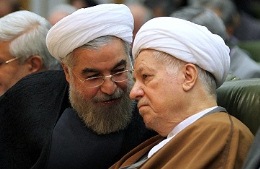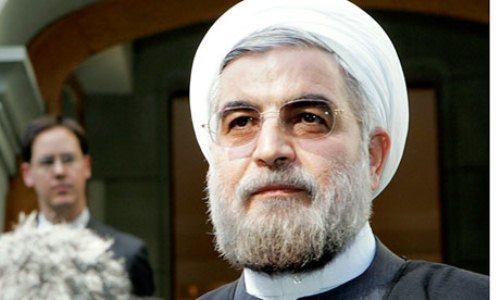 Presidential candidate Hassan Rowhani may have the credentials to steer Iran to a diplomatic breakthrough.
Presidential candidate Hassan Rowhani may have the credentials to steer Iran to a diplomatic breakthrough.Hassan Rowhani was considered an early frontrunner in the runup to the 2005 Iranian presidential election, before eventually deciding not to run.
The former nuclear negotiator's entry into the 2013 election, then, carries a hint of deja vu. Leading the Iranian delegation in the 2003-05 nuclear talks with Europe, Rowhani took Iran�the nearest it has come to a substantive diplomatic agreement with the west since the 1979 Islamic revolution.
Nearly a decade later, could a Rowhani presidency lead to a diplomatic breakthrough, easing Iran back from punitive sanctions and the possibility of US or Israeli attack?
It is a tall order. To win the election, he will need to convince voters he is a man of the future and not the past. And to reach international agreement over the nuclear programme, he will need to succeed where he previously failed in bringing together Iran's Islamic leadership and western powers whose real goal � many in Iran believe � is to overthrow the Islamic republic.
Perhaps Rowhani has as good credentials as anyone for such a task. Essentially a pragmatic conservative, the 64-year-old cleric is an insider of the Islamic establishment.
Born near Semnan, north of the central desert, he began religious studies aged 12 and rose to the rank of hojjat al-islam, one below ayatollah. After completing a degree at Tehran University, he got his PhD in Glasgow in the 1970s, but left to join Ayatollah Ruhollah Khomeini in Paris as the shah's Iran drifted towards the 1979 revolution.
In the last year of the 1980-88 conflict with Iraq, Rowhani was deputy to the war commander and later president, Akbar Hashemi Rafsanjani.
The pair remain close, with Rowhani sharing the 78-year-old conservative's belief that dialogue with the US can benefit Iran. Two of Rafsanjani's children, Yasir and Fatemeh, attended the recent press conference when Rowhani announced his candidacy.
Rowhani has also enjoyed the confidence of the�rahbar, or leader, Ayatollah Ali Khamenei, and has sat on the supreme national security council (SNSC) as Khamenei's appointee since 1989.
In October 2003, Khamenei handed responsibility to Rowhani, then SNSC secretary, for leading negotiations with the "EU3" � Germany, Britain and France � over Iran's nuclear programme.
But the leader's backing was not enough to shelter Rowhani from growing domestic criticism as the talks dragged on into 2005.
Iran had suspended uranium enrichment as a "goodwill" gesture, but the Europeans demanded this be extended while offering in return only vague economic and diplomatic incentives.
Rowhani decided not to stand in the 2005 poll, and was removed as lead nuclear negotiator after Mahmoud Ahmadinejad crushed a lacklustre campaign by Rafsanjani and won the election.
The intervening eight years have seen Iran slowly expand its nuclear programme, but at the cost of tougher sanctions that have halved oil exports in about a year.
Pragmatists within Iran's establishment have questioned the conduct of foreign policy while looking back favourably on the days of more substantive diplomacy. Certainly, Rowhani is respected as a tough operator in Iran and by European diplomats who dealt with him in 2003-05.
But can he win? He faces many challenges � most obviously that he has hardly been at the forefront of public attention through his continued membership of the SNSC or through sitting on the Experts' Assembly, the clerical body that monitors the leader.
His electoral strategy will be threefold. First, he will project himself as a competent manager with a technocratic approach to an economy lacking productive investment, or as Rowhani put it: "We need a new management�� through unity, consensus and attracting honest and efficient people." This means exposing Ahmadinejad's populist and inflationary policies � including his cash handouts to most Iranians.
Secondly, he will look to take advantage of the link between the economy and the nuclear programme, given that sanctions have halved Iran's oil exports in the last year and contributed to a marked decline in the currency.
In a recent interview, Rowhani said nuclear strategy was the responsibility of Khamenei, but that government could "greatly influence the tactics and the method of execution". Clearly Rowhani believes that with "strategy" not an election issue, he can portray himself as a trustworthy pair of hands.
Thirdly, Rowhani will seek to woo reformists who may otherwise ignore the election � and this could explain his call for a "rights charter" and support for "freedom of expression, thought and discussion".
So, overall, his presidential bid will recognise the need to tackle the serious challenges facing the country. He put it in starkly in an interview this week with the Shargh newspaper: "In terms of economics, the people are under pressure and all the economic indexes announce danger. It is said that economic growth is zero, or even negative��
"On the discussion of foreign policy as well, our situation is very undesirable. Our relations with many countries are on the lowest level. We do not have a desirable relationship with the world in terms of politics and economics."
How will Rowhani's pitch play with voters? One analyst in Tehran expressed scepticism: "I can think of no compelling reason why anybody here would vote for Hassan Rowhani. He strikes me as bland, and never connected with people as such."
Are Iranian voters looking for excitement? Three of the past four presidential elections � the exception being Mohammad Khatami's second, 2001 victory � have thrown up surprises. This is due partly to a volatile public mood, and partly because of the factions established among would-be presidential candidates do not make up for Iran's lack of political parties.
Slowly, perhaps late, frontrunners will emerge, and the field, which is dominated by "principle-ist" candidates, will thin. One uncertainty should clear next month when the Guardian Council decides whether to allow Ahmadinejad's ally, Efsandiar Rahim Mashaei, to run.
If he makes the ballot, Mashaei may be the man to beat. For Rowhani to succeed, he will need every atom of his experience and tough skin.
By The�Guardian
The Iran Project is not responsible for the content of quoted articles.











